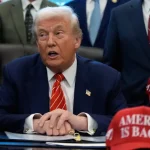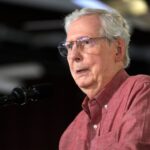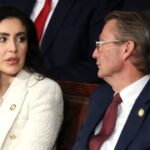

President Joe Biden is making a case for himself in his final days, preparing a Tuesday speech on the economy as he looks toward his post-presidential future.
According to the White House, Biden will speak on his “middle-out-bottom-up economic playbook” at the prominent Brookings Institution think tank in Washington, delivering what it describes as a major address on his economic legacy.
“After decades of trickle-down economics that slashed taxes for the wealthy, diminished public investments, offshored jobs and factories, destroyed unions, and ripped at the social safety net, President Biden has written a new playbook that’s growing the economy from the middle out and the bottom up,” a White House official said, previewing the remarks.
The speech comes after an election in which the economy was one of the top issues leading to President-elect Donald Trump‘s victory, giving Biden’s critics plenty of ammunition.
“Biden will be remembered for the three D’s — debt, deficits, and declining incomes,” Heritage Foundation economist Stephen Moore said. “He is the most failed president in modern times. He leaves office with record-low approval ratings. History will not treat him kindly.”
That’s exactly the view Biden may be hoping to change with the late-stage speech.
According to the White House, Biden will focus on how infrastructure, manufacturing, scientific development, and communities had been left behind by “decades of neglect” prior to him becoming president, which Biden began the work to turn around during his single term in the Oval Office.
That’s the view held by Center for American Progress economist David Madland.
“He made a big shift toward policy that focuses on unions and the working class,” Madland said. “Ultimately, that policy hasn’t done enough yet, but the Biden legacy is one of bringing back the idea that the point of policy is to strengthen working-class outcomes.”
Biden has described himself as the most pro-union president in history, and Madland argues that he is part of a bipartisan push to refocus on how the economy affects individuals and families rather than looking only at top-down growth.
“Both Trump and Biden are really part of this big shift that’s a rejection of trickle-down economics, and now the question hopefully is that — what’s the best way forward to make policy that helps unions and workers,” he said.
During his first years in office, Biden was able to usher several economic bills through Congress, including the $1.2 trillion Infrastructure Investment and Jobs Act, the $280 billion CHIPS and Science Act, and the $891 billion Inflation Reduction Act.
Biden backers say it will take years or even decades for the full impact of those bills to be felt, as they funded investment in projects that are just beginning.
That’s something the president is likely to say himself as he works to shore up a legacy marked by inflation, poor marks in economic polls, and the reemergence of Trump as a political force. Just over a month from now, Biden will hand the White House back to the man he took it from, an occurrence that has happened only once before in American history.
Among the statistics Biden is likely to cite are 16 million jobs created since he took office in the throes of pandemic lockdowns, unemployment that consistently hovered in the low single digits, 20 million new business applications, and steady stock market growth.
CLICK HERE TO READ MORE FROM THE WASHINGTON EXAMINER
He will contrast that with what he says is Trump’s vision of tax cuts for high earners and reduced investments in government-funded projects.
With about 40 days left in his term, Biden’s approval rating on the economy sits at 39.3%, according to the RealClearPolitics average.






